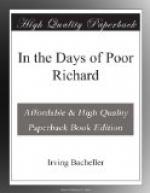John Irons was well known to Colonel Schuyler. The good man gave the newcomers a hearty welcome and was able to sell them a house ready furnished—the same having been lately vacated by an officer summoned to England. So it happened that John Irons and his family were quickly and comfortably settled in their new home and the children at work in school. He soon bought some land, partly cleared, a mile or so down the river and began to improve it.
“You’ve had lonesome days enough, mother,” he said to his wife. “We’ll live here in the village. I’ll buy some good, young niggers if I can, and build a house for ’em, and go back and forth in the saddle.”
The best families had negro slaves which were, in the main, like Abraham’s servants, each having been born in the house of his master. They were regarded with affection.
It was a peaceful, happy, mutually helpful, God-fearing community in which the affairs of each were the concern of all. Every summer day, emigrants were passing and stopping, on their way west, towing bateaux for use in the upper waters of the Mohawk. These were mostly Irish and German people seeking cheap land, and seeing not the danger in wars to come.
There is an old letter from John Irons to his sister in Braintree which says that Jack, of whom he had a great pride, was getting on famously in school. “But he shows no favor to any of the girls, having lost his heart to a young English maid whom he helped to rescue from the Indians. We think it lucky that she should be far away so that he may better keep his resolution to be educated and his composure in the task.”
The arrival of the mail was an event in Albany those days. Letters had come to be regarded there as common property. They were passed from hand to hand and read in neighborhood assemblies. Often they told of great hardship and stirring adventures in the wilderness and of events beyond the sea.
Every week the mail brought papers from the three big cities, which were read eagerly and loaned or exchanged until their contents had traveled through every street. Benjamin Franklin’s Pennsylvania Gazette came to John Irons, and having been read aloud by the fireside was given to Simon Grover in exchange for Rivington’s New York Weekly.
Jack was in a coasting party on Gallows Hill when his father brought him a fat letter from England. He went home at once to read it. The letter was from Margaret Hare—a love-letter which proposed a rather difficult problem. It is now a bit of paper so brittle with age it has to be delicately handled. Its neatly drawn chirography is faded to a light yellow, but how alive it is with youthful ardor:




